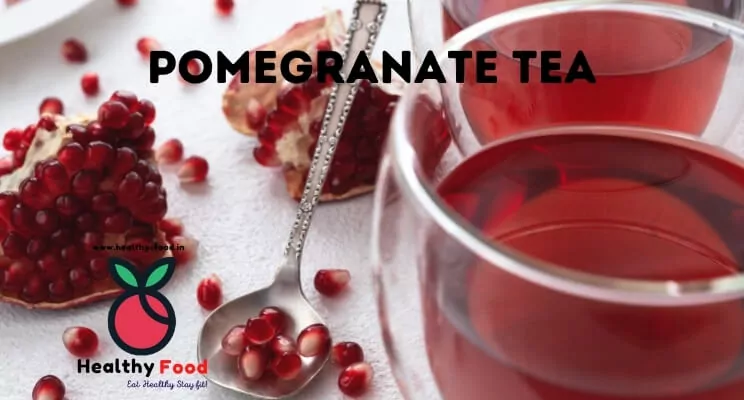Article Contents
Pomegranate Tea Recipe
Pomegranate tea is a storehouse of nutrients such as fiber, protein, vitamin C, vitamin K, folate, potassium, and plant compounds such as punicalagins which help keep the body healthy and healthy.
The seeds and the delicious cover around them – called arils – are edible parts of the pomegranate fruit.
Pomegranate tea is a special tea made from the pulp (extract) of pomegranate seeds, dried flowers of pomegranate, or simply by pouring some amount of pomegranate juice into a regular cup of tea, such as green tea, black tea, black coffee, white tea, or herbal tea.
Thick and nutritious pomegranates are a good source of energy, and their high iron content helps prevent iron deficiency like anemia.
Drinking pomegranate tea is a fantastic way to enhance heart health and prevent certain cancers, along with many other good health benefits.
Studies suggest that drinking pomegranate tea may help reduce the risk of injury to the placenta.
According to the USDA, 1/2 cup pomegranate juice provides 10% of potassium, 20% of vitamin C, 13% vitamin D, 5% of calcium for your daily needs depending on 2000 calorie food per day.
Potassium helps lower blood pressure and maintains a steady heartbeat. Vitamin C can help reduce the risk of other cancers, according to Harvard Health Publishing.
Vitamin D and Vitamin K help maintain blood calcium levels, which in turn strengthens your bones.
Antioxidants; found in pomegranates are shown to boost the immune system and help the body fight and prevent our cells from aging.
Pomegranate Tea Nutrition Information
One cup of homemade pomegranate tea contains:
- Calories: 6
- Protein: 0 grams
- Fat: 0 grams
- Carbohydrates: 1 gram
- Thread: 0 grams
- Sugar: 0 grams
Pomegranate Tea Benefits
1. Pomegranate tea improves cardiovascular health
When it comes to pomegranate tea benefits, the first thing comes to knowlege is how pomegranate tea can improve cardiovascular health by preventing cholesterol from getting involved in the formation of plaque in your arteries.
As the plaque builds up in the bloodstream, it can block the blood flow and increase the risk of heart attack or stroke.
One 28 days study of 51 people suffering from high triglyceride levels taking 800 mg of pomegranate seed oil per day.
At the end of the study, they showed a drastic change in triglyceride levels.
Researchers suggest that punicic acid found in pomegranate shows to maintain LDL (bad cholesterol) particles from oxidizing, which causes heart disorder.
Studies show that pomegranate tea can lower blood pressure, which in turn contributes significantly to heart disease.
2. Pomegranate tea is good for skin care
Pomegranate is packed with vital compounds and nutrients that improve skin health and keep it bright, radiant, and clear.
The antioxidants found in pomegranate seeds are an impressive set of free-fighting compounds, which can help lighten the appearance of your skin.
Pomegranate tea is a healthy source of antioxidants that prevent aging and eliminate free radicals from body cells; it reduces skin damage caused by oxidation.
Pomegranate tea reduces the effects of oxidative stress, which can eliminate wrinkles, age spots, blemishes, and scars on the skin, also improving the firmness of keeping you looking younger.
In addition, the antioxidants present in pomegranate seeds also help fight inflammation, acne, and bacterial infections.
3. Pomegranate tea helps weight loss
Mixing your pomegranate blend with regular tea can give your body a lot of energy,
Pomegranate tea boosts metabolism rate; the tea can help improve your fat-burning capacity, which means that you can burn more calories if you try to shed those extra pounds.
There is about 4g of fiber in dry cups of pomegranate since pomegranates are rich in slow-digesting fibers; pomegranate keeps you feeling full for a long time, therefore; effectively helps in weight loss.
Due to the highest concentration of antioxidants, regular intake of pomegranate juice can reduce the risk of heart disease.
Pomegranate fruit (Punica granatum) has a high polyphenols content and is known for its antioxidant properties.
In particular, it is known to reduce oxidative stress, and therefore, plays a productive role in preventing the pathogenesis of fatty liver disease.
4. Pomegranate tea reduces inflammation
Chronic inflammations are thought to cause many serious illnesses, including diabetes, cancer, and heart disease.
Punicalagins compounds found in pomegranate have been shown to have excellent anti-inflammatory properties.
Regular consumption of this pomegranate tea has been linked to reduced immune response, which reduces unwanted inflammation in the body.
Pomegranate tea can also help reduce the symptoms of common conditions such as arthritis, gout, and chronic headaches.
Some test-tube studies show that pomegranate punicalagins reduce inflammatory activity in the digestive tract, colon cancer cells, and breast cancer.
5. Pomegranate tea lower blood pressure
High blood pressure is a highly leading cause of heart attacks and strokes.
Anti-inflammatory properties of pomegranate juice and seeds have been shown to reduce high blood pressure.
In one study, after eating five ounces of pomegranate seeds daily for two weeks, the hypertension patient showed a drastic change in their blood pressure.
Other studies also have found similar results, particularly systolic blood pressure, the highest number in the study of blood pressure.
6. Pomegranate tea promotes dental health
Pomegranate tea contains antibacterial and anti-fungal agents which prevent plaque formation and also help fight infections.
The tea helps fight against the inflammation in the mouth caused by poor oral hygiene, such as gingivitis and periodontitis.
By chewing pomegranate seed helps in gum exercising and maintain healthy blood circulation over Jaw area.
Most importantly, we should take the pomegranate tea or add some flavor to our traditional masala chai (tea), black tea, or herbal tea.
7. Pomegranate tea contains anti-cancer properties
There are powerful flavonoids and antioxidants in green tea mixed with pomegranate tea known to reduce bladder cancer cells before they spread.
Researchers at the University of Alabama in Birmingham show that pomegranate extracts have anti-inflammatory and anti-tissue properties.
The properties help understand that pomegranate tea can be used as a promising chemopreventive/chemotherapeutic agent for skin, lung, chest, colon, and prostate cancer.
The 2018 research paper in the journal Oncology Reviews suggests that pomegranate and its tea can also help reduce the risk of liver cancer.
8. Pomegranate tea regulates oxygen levels in our body
Pomegranate tea helps to enhance the level of oxygen in our blood.
The antioxidant-packed pomegranates help lower cholesterol levels, fight free radicals, and prevent blood clotting.
All of this ultimately helps the blood flow more freely and thus, improves oxygenation of muscle tissue.
9. Pomegranate fights Arthritis and Joint pain
Rheumatoid arthritis is a common problem face by today’s generation.
There are many different types of arthritis, but most include some inflammation in the joints and attacks on internal organs.
Given that herbal extracts from pomegranates have anti-inflammatory action, so they may help treat arthritis patients.
Additionally, researchers have done some laboratory studies and found that pomegranate tea may block the harmful enzymes that can damage the joints of osteoarthritis patients.
Pomegranate extracts have also been shown to relieve arthritis in rats, but human-based evidence from research is very limited to date.
10. Pomegranate tea fights against fungal infections
The compounds found in pomegranate can help fight against harmful microorganisms and may cure fungal infections.
For example, they have been shown to fight certain types of bacteria and the yeast Candida albicans.
Anti-fungal and antimicrobial properties present in pomegranate help fight against infections and inflammation in your oral cavity.
These include conditions such as denture stomatitis, gingivitis, and periodontitis.
Pomegranate juice has various phytochemical compounds that demonstrate antimicrobial activity.
Pomegranate extract contains methanolic acid that helps in increasing the rate of wound healing.
Pomegranate tea has antiviral properties to minimize or prevent viral diseases such as herpes, HIV, pox, influenza, and Food borne viral pathogen.
11. Pomegranate tea enhances the intake of antioxidants
Since pomegranates are a powerhouse of nutrients, minerals, and antioxidants. Pomegranate tea has been prepared in many different ways from thousands of years ago.
Pomegranate juice and tea are rich in nutrients. The two chemicals present in pomegranate seeds – punicalagins and punicic acid – are the most potent antioxidants.
Pomegranate tea contains flavonoids called anthocyanins and anesthetics natural, plant-based chemicals.
Due to the high source of antioxidant level present in pomegranate, it is highly used to manufacturing medicines for cancer, osteoarthritis, digestive disorder, cough, urinary infection, expel tapeworms, and skin disorders.
One study shows that punicalagins contained three times more than the antioxidant content of green tea and red wine.
Risk:
There seems to be no risk of drinking pomegranate tea.
You should know that although some of the benefits of the pomegranate can be passed on, from tea to tea.
It is best to drink sugar-free pomegranate juice or tea to get the full benefit.
If you are making pomegranate tea at your home on your own, you must remember the amount of sugar added to the tea. Too much sugar can deprive you of any health benefits you get from pomegranate juice in your tea.
Pomegranate Tea FAQs
1. What is pomegranate tea?
Pomegranate tea is a kind of special tea that you can prepare adding pomegranate seeds (crushed), dried pomegranate flowers, and mixing concentrated pomegranate juice in the hot or boiling water.
2. Is Pomegranate Tea good for You?
Thinking and caring for our health should be our top priority. However, when it comes to tea, we tend to prefer taste over anything else.
For many people, tea is an integral part of their day-to-day lives. Besides, research has shown that tea consumption worldwide is increasing over time.
With the tea increase, we should also look at its health benefits to know about the treasure reserved for our cup of tea.
The red ruby fruit pomegranate, also known as anaar, has many health benefits and is considered one of the healthiest fruits.
3. How to Make Pomegranate Tea
To make simple pomegranate tea at home, follow these easy steps:
Tea Making from seed:
Put 3 cups of pomegranate seeds in a blender
Add 1/2 cup sugar and mix well – consider reducing this or completely cutting out a healthy drink
Strain the juice into a container to store it
Combine 1/4 cup pomegranate extract with 3/4 cup boiling water
Tea Making from Flowers:
Boil some water in a pan or kettle
Dip 1/4 cup dried pomegranate flowers in one cup of boiling water for 3-4 minutes
Add some sugar to your taste
Boil it for 2 minutes
Then the tea is ready to serve

